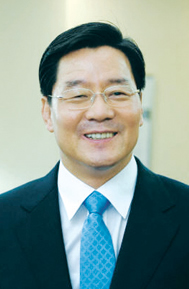KICOX: 'Environmentally-Friendly, Ecological Industrial Park'
CEO describes field-oriented reorganization
 Korea Industrial Complex Corp. (KICOX) President Park Bong-kyu said, "KICOX will devote its energies into streamlining its structure into a field-oriented one and introduce more efficient support services this year." Explaining KICOX's business plan for 2009 at a press conference in Yeouido, Seoul on Jan. 13, Park said his corporation would be transformed into a new organization pursuing innovative changes. "We will step up the field functions of industrial complexes, so a large number of employees at the KICOX headquarters have already been reassigned to regional industrial complexes and more will be added as reinforcements." KICOX was previously reorganized to make it more streamlined and effective. The KICOX president said his corporation will make every effort to put into full swing a time-consuming, costly task: upgrading and transforming industrial complexes into environmentally-friendly ones.
Korea Industrial Complex Corp. (KICOX) President Park Bong-kyu said, "KICOX will devote its energies into streamlining its structure into a field-oriented one and introduce more efficient support services this year." Explaining KICOX's business plan for 2009 at a press conference in Yeouido, Seoul on Jan. 13, Park said his corporation would be transformed into a new organization pursuing innovative changes. "We will step up the field functions of industrial complexes, so a large number of employees at the KICOX headquarters have already been reassigned to regional industrial complexes and more will be added as reinforcements." KICOX was previously reorganized to make it more streamlined and effective. The KICOX president said his corporation will make every effort to put into full swing a time-consuming, costly task: upgrading and transforming industrial complexes into environmentally-friendly ones.
Park said his corporation will focus on the commercialization of recycling 10 wastes into resources under previously devised projects and push for the expansion of a network of projects related to the recycling of wastes. KICOX will also push for making ecological industrial parks bigger and building more ecological industrial parks without a hitch.
He said manpower will be reassigned to core business areas and KICOX plans to work out an option to outsource non-essential business areas in order to enhance efficiency.
KICOX plans to improve field services catering to SMEs, he said. The corporation will create parking space within KICOX by investing about 30 billion won, and the program will be expanded to secure apartment-type factory sites, a move designed to create new investment opportunities by providing industrial space tailored to customers, he said.
In a related development, the government unveiled a plan to establish greater economic sphere clusters with industrial complexes playing a leading role in sync with the government's Greater Economic Cluster Development Plan (5+2).
The plan is part of the government's vision of developing industrial complexes by 2012 and the four roadmaps for the implementation of the vision, calling for establishing greater economic sphere clusters; upgrading the structure of industrial complexes; building up eco-industrial parks (EIP) for ensuring low-carbon green growth; and setting up a network for global marketing promotion.
These were disclosed by the government during the 3rd Industrial Cluster Day, organized by the Ministry of Knowledge Economy, the Presidential Committee on Balanced National Development and KICOX, at the Sheraton Walker Hill Hotel in Seoul on Nov. 12.
Titled "Recreating Competitive Global Innovation Clusters," the Cluster Day anniversary event was attended by roughly 500 notables, including representatives of industry, academia and research circles.
In a message at the opening ceremony, Choe Sang-chuel, chairman of the Presidential Committee on balanced National Development, said, "Every country in the world is concurrently pursuing both conurbation and decentralization to strengthen the competitive power of its regions. The Lee Myung-bak government has promoted policies to establish a wide-ranging economic zone and develop specialized regions in a move to keep abreast of the global trend, while continuing to implement the balanced national development policy pursued by his predecessors.
"The industrial complexes are the integrated areas of the manufacturing industry, a major sector of the Korean economy, and have played a pivotal role in developing the economy of the country and its regions. They will be recreated as a combined place where industrial activities and living environment coexist in perfect harmony. Recreated industrial complexes are expected to greatly help strengthen the nation's competitive power and stimulate the region's economic growth." KICOX President Park said in a welcoming message at the opening ceremony, "The industrial complexes, which are the integrated areas of the manufacturing industry, often dubbed the principle engine of growth, require renovation and restructuring as the external environment has become tougher, the knowledge-based economy has been adopted, corporate positions have been changed in terms of demand, the traditional manufacturing industry has turned into a higher-value-added business, the industrial complexes have become obsolete and low-carbon green growth has been emerging as an issue." nw
Korea Industrial Complex Corp. (KICOX) President Park Bong-kyu
3Fl, 292-47, Shindang 6-dong, Chung-gu, Seoul, Korea 100-456
Tel : 82-2-2235-6114 / Fax : 82-2-2235-0799